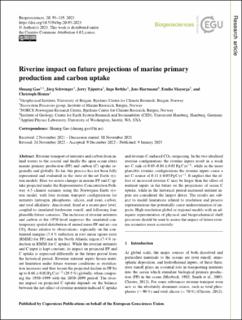| dc.contributor.author | Gao, Shuang | |
| dc.contributor.author | Schwinger, Jörg | |
| dc.contributor.author | Tjiputra, Jerry | |
| dc.contributor.author | Bethke, Ingo | |
| dc.contributor.author | Hartmann, Jens | |
| dc.contributor.author | Mayorga, Emilio | |
| dc.contributor.author | Heinze, Christoph | |
| dc.date.accessioned | 2024-02-07T15:14:47Z | |
| dc.date.available | 2024-02-07T15:14:47Z | |
| dc.date.created | 2023-01-25T23:27:52Z | |
| dc.date.issued | 2023 | |
| dc.identifier.issn | 1726-4170 | |
| dc.identifier.uri | https://hdl.handle.net/11250/3116232 | |
| dc.description.abstract | Riverine transport of nutrients and carbon from inland waters to the coastal and finally the open ocean alters marine primary production (PP) and carbon (C) uptake regionally and globally. So far, this process has not been fully represented and evaluated in the state-of-the-art Earth system models. Here we assess changes in marine PP and C uptake projected under the Representative Concentration Pathway 4.5 climate scenario using the Norwegian Earth system model, with four riverine transport configurations for nutrients (nitrogen, phosphorus, silicon, and iron), carbon, and total alkalinity: deactivated, fixed at a recent-past level, coupled to simulated freshwater runoff, and following four plausible future scenarios. The inclusion of riverine nutrients and carbon at the 1970 level improves the simulated contemporary spatial distribution of annual mean PP and air–sea CO2 fluxes relative to observations, especially on the continental margins (5.4 % reduction in root mean square error (RMSE) for PP) and in the North Atlantic region (7.4 % reduction in RMSE for C uptake). While the riverine nutrients and C input is kept constant, its impact on projected PP and C uptake is expressed differently in the future period from the historical period. Riverine nutrient inputs lessen nutrient limitation under future warmer conditions as stratification increases and thus lessen the projected decline in PP by up to 0.66 ± 0.02 Pg C yr−1 (29.5 %) globally, when comparing the 1950–1999 with the 2050–2099 period. The riverine impact on projected C uptake depends on the balance between the net effect of riverine-nutrient-induced C uptake and riverine-C-induced CO2 outgassing. In the two idealized riverine configurations the riverine inputs result in a weak net C sink of 0.03–0.04 ± 0.01 Pg C yr−1, while in the more plausible riverine configurations the riverine inputs cause a net C source of 0.11 ± 0.03 Pg C yr−1. It implies that the effect of increased riverine C may be larger than the effect of nutrient inputs in the future on the projections of ocean C uptake, while in the historical period increased nutrient inputs are considered the largest driver. The results are subject to model limitations related to resolution and process representations that potentially cause underestimation of impacts. High-resolution global or regional models with an adequate representation of physical and biogeochemical shelf processes should be used to assess the impact of future riverine scenarios more accurately. | en_US |
| dc.language.iso | eng | en_US |
| dc.publisher | Copernicus | en_US |
| dc.rights | Navngivelse 4.0 Internasjonal | * |
| dc.rights.uri | http://creativecommons.org/licenses/by/4.0/deed.no | * |
| dc.subject | Elvetilførsler | en_US |
| dc.subject | Riverine inputs | en_US |
| dc.subject | Jordsystem modelling | en_US |
| dc.subject | Earth system modeling | en_US |
| dc.title | Riverine impact on future projections of marine primary production and carbon uptake | en_US |
| dc.type | Journal article | en_US |
| dc.type | Peer reviewed | en_US |
| dc.description.version | publishedVersion | en_US |
| dc.rights.holder | Copyright 2023 the authors | en_US |
| cristin.ispublished | true | |
| cristin.fulltext | original | |
| cristin.qualitycode | 1 | |
| dc.identifier.doi | 10.5194/bg-20-93-2023 | |
| dc.identifier.cristin | 2115254 | |
| dc.source.journal | Biogeosciences | en_US |
| dc.source.pagenumber | 93-119 | en_US |
| dc.relation.project | EU/641816 | en_US |
| dc.relation.project | EU – Horisont Europa (EC/HEU): 101083922 | en_US |
| dc.relation.project | Norges forskningsråd: 309562 | en_US |
| dc.relation.project | Sigma2: ns2980k | en_US |
| dc.relation.project | Trond Mohn stiftelse: BFS2018TMT01 | en_US |
| dc.relation.project | Sigma2: nn2980k | en_US |
| dc.relation.project | Sigma2: ns2345k | en_US |
| dc.relation.project | Sigma2: nn2345k | en_US |
| dc.relation.project | Norges forskningsråd: 318477 | en_US |
| dc.subject.nsi | VDP::Geofag: 450 | en_US |
| dc.subject.nsi | VDP::Geosciences: 450 | en_US |
| dc.identifier.citation | Biogeosciences. 2023, 20 (1), 93-119. | en_US |
| dc.source.volume | 20 | en_US |
| dc.source.issue | 1 | en_US |

